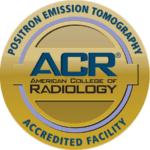Convenience is important so we can often accommodate same-day exams and flexible scheduled appointments. The cost of a PET/CT exam is substantially lower than the cost of the same exam performed at a local hospital. We believe that offering value, without compromise, is the right thing to do.
PET/CT
A Better PET/CT Experience
What is PET/CT?
PET (Positron Emission Tomography) and CT (Computed Tomography) are both standard imaging tools that physicians use to pinpoint dis-ease states in the body. The PET scan demonstrates the biological function of the body often before anatomical changes take place, while the CT scan provides information about the body’s anatomy such as size, shape and location. By combining these two technologies physicians can more accurately identify, diagnose and stage cancer and brain disorders.

Common Uses of PET/CT
Oncology
- Determine benign from malignant tumors in suspicious areas
- Survey the entire body for cancer that may have spread
- Monitor success of therapy
- Detect recurrent tumors
- Assess tumor aggressiveness
Neurological Disease
PET’s ability to measure cerebral metabolism and blood flow make it extremely valuable in a variety of neurological diseases like refractory epilepsy, brain tumors, dementia, and other movement disorders.

